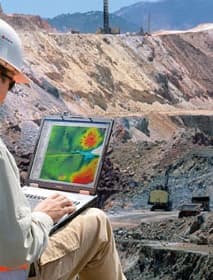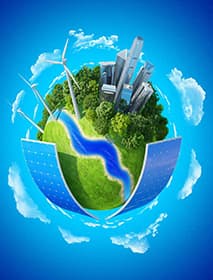1. Section Geological Sciences and Resource Management
Focuses on the study of Earth's structure, processes, and materials, while optimizing the management of geological resources to ensure sustainable use and minimize environmental impact. Emphasizes both foundational geological sciences and sustainable management of geological resources, aligning with high-impact publications and SDG 12 (Responsible Consumption and Production).- Tectonics and Structural Geology
- Geological Mapping and Resource Assessment
- Petrology and Mineralogy of Ore Deposits
- Geological Hazards and Risk Management
- Sedimentary Processes and Basin Analysis
- Volcanology and Magmatic Systems
- Paleontology and Stratigraphy for Resource Exploration
- Mineral Resource Economics and Sustainable Management
- Geological Approaches to Carbon Sequestration
- Sustainable Land Use and Geological Resource Planning (New)
2. Section Hydrogeology, Engineering Geology, and Climate-Resilient Geotechnics
Explores the interaction between water and geological formations, applying engineering principles to design climate-resilient geotechnical solutions for infrastructure and resource management. “Climate-Resilient” reflects the focus on sustainability and innovative geotechnical solutions, a trending area in academic research and SDG 6 (Clean Water and Sanitation) and SDG 9 (Industry, Innovation, and Infrastructure).- Groundwater Flow and Contaminant Transport
- Groundwater Resources and Sustainable Management
- Hydrological Modeling and Climate Resilience
- Geotechnical Engineering in Hazardous Environments
- Soil-Structure Interaction in Geotechnical Engineering
- Engineering Geology for Infrastructure Development
- Aquifer Recharge and Groundwater Conservation Strategies
- Geotechnical Solutions for Coastal and Flood-Prone Areas (New)
- Climate-Resilient Foundations and Earth Structures (New)
- Hydrological Responses to Climate Change and Extreme Events (New)
3. Section Sustainable Exploration and Mining Technologies
Develops and applies environmentally responsible exploration and mining practices, emphasizing reduced ecological footprints and sustainable resource extraction. Highlights sustainability and cutting-edge technologies, aligning with SDG 12. The "Sustainable Exploration" appeals to current trends and focuses on responsible mining practices.- Innovative Exploration Techniques for Mineral Resources
- Remote Sensing and Geophysics in Exploration
- Advanced Drilling and Mining Technologies
- Low-Impact Mining and Exploration Methods
- AI and Machine Learning for Mineral Exploration (New)
- Autonomous Systems in Mining Operations (New)
- Sustainability in Resource Discovery and Exploration
- Mineral Prospecting and Mapping Using Modern Technologies
- Risk Assessment and Environmental Impact Mitigation in Exploration
- Sustainable Mineral Supply Chains and Ethical Sourcing (New)
4. Section Sustainable Mineral Processing and Resource Efficiency
Focuses on the development of innovative methods to improve the efficiency of mineral processing while minimizing waste and environmental degradation. With a clear alignment to SDG 12 (sustainability and resource efficiency).- Advanced Mineral Processing Techniques for Resource Efficiency
- Energy-Efficient and Low-Emission Processing Technologies
- Waste Minimization in Mineral Processing
- Circular Economy in Mineral Processing (New)
- Tailings Management and Environmental Reclamation
- Water Conservation and Reuse in Mineral Processing
- Processing of Complex Ores and Low-Grade Deposits
- Automation and AI in Mineral Processing (New)
- Green Chemicals and Eco-Friendly Technologies in Processing
- Life-Cycle Analysis of Mineral Products (New)
5. Section Geophysical Methods for Environmental and Resource Monitoring
Utilizes geophysical techniques to monitor environmental conditions and assess resources, supporting sustainable management of the Earth’s subsurface. Aligns with SDG 13 (Climate Action) and SDG 15 (Life on Land).- Seismic Methods in Resource and Environmental Monitoring
- Electromagnetic Methods for Subsurface Investigations
- Geophysical Techniques for Groundwater Exploration
- Remote Sensing and InSAR for Environmental Monitoring (New)
- Gravity and Magnetic Methods in Geological Exploration
- Geophysical Data Integration and Machine Learning (New)
- Monitoring of Volcanic and Seismic Hazards
- Near-Surface Geophysics for Environmental Assessment
- Geophysical Monitoring for CO2 Sequestration and Storage (New)
- UAV-Based Geophysical Surveys for Resource Assessment (New)
6. Section Sustainable Oil, Gas, and Energy Transition Exploration
Investigates sustainable approaches to oil and gas exploration, with a focus on technologies that facilitate the global transition toward renewable energy sources. Aligns with SDG 7 (Affordable and Clean Energy) and SDG 13 (Climate Action).- Sustainable Oil and Gas Exploration Technologies
- Carbon Capture, Utilization, and Storage (CCUS)
- Transition to Low-Carbon Energy Systems in Oil and Gas
- Hydrogen Storage and Production Technologies (New)
- Unconventional Oil and Gas Resources: Environmental Considerations
- Digital Transformation and AI in Energy Exploration (New)
- Environmental Impact and Sustainability of Offshore Exploration
- Geothermal Energy Exploration and Integration (New)
- Enhanced Oil Recovery (EOR) in the Context of Energy Transition
- Renewable Energy Integration in Oil and Gas Operations (New)













